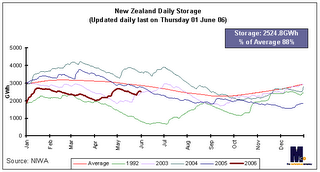or, how much am i willing to pay to make sure i'm not affected by a power outage?
(and no, i don't rate the $100 million estimate plucked out the arse of the manufacturer's association guy. I mean really, don't reporters bother challenging these sorts of off the cuff remarks?)
This is really the crux of the issue. Auckland had a half-day power outage on Monday due to an earth line falling across the 220 kV line at Otahuhu. Yep, pretty freaky but not entirely unforeseeable.
Now personally, i'd rate a big outage and power back in half a dozen hours as pretty good, last time i looked, the number of down hours in NZ is measured as a handful
per year. That's pretty impressive considering all the stuff that has to go on day to day.
So therefore, our question changes to: How much am i willing to pay to make sure i'm not affected by a power outage for more than say, 2 hours?
If you plot the frequency (number) of outages for a period of time x, you'll get a frequency distribution that will have a very long tail i.e. you may get a half dozen outages a year for 10 min, but only 1 for an hour and then fractions of an event for times longer than that.
So therefore, our question now changes to: How much am i willing to pay to make sure i'm not affected by a power outage for more than say, 2 hours, which has a 0.01% chance of happening in any particular year?
If this sounds like a question that you're more likely to hear from a booky or an insurance salesmand... it's because they're the sort of people that make a living answering questions like this.
So let's throw some back of the envelope numbers around. Hard News had some feedback on generator prices. Let's say $10,000 gets you installed (with a cafe sized unit, obviously the more stuff you have the bigger the generator) with all the bells and whistles, is it money well spent? I'd say if you're running a cafe, no. You'd have to schedule maintenance (it's pointless having the false security of diesel genset if you don't maintain it) and have it sit somewhere, all for the benefit of a handful of hours of custom, maybe, once every couple of years. Of course, you could argue that you'd make a bucketful of cash being the only CBD cafe pumping out the caffeine and that may tip the balance of your calculation ;-) go you entrepenuer...
So who would want one? Companies that absolutely MUST NOT STOP what they're doing. People like hospitals, Telecom, Sky casino, Visa, Eftpos, and you'd hope police/fire/ambulance - stuff like that. They're calculation however, involves more esoteric variables such as brand impact, common good benefits (police/ambulance units able to respond), and for hospitals...lives.
So that's the main problem with insuring yourself against these events (yep, it's a self-insurance question at the end of the day), it just doesn't make sense. I won't even start on the problems of having loads of dirty, crappy diesel gensets running for hours on end in the CBD and how you'd run foul of the RMA if you used them in anything but an emergency; the noise and smog alone would drive you insane or the implications for the local network in having anybody and everybody pumping into the local network (are you positive you're islanded properly? who checked?).
And this is from someone who is trying to develop distributed generation products. I'd love to see a network that encouraged small scale generation at point of use but changing a 100 year old system is an uphill battle. Of course, having some distributed generation products that weren't ludicrously expensive wouldn't hurt the cause...
So all up, a nice reminder to everyone on how electricity is a fundamental commodity in a modern country, it's almost, and i cringe to say it...
strategic.








